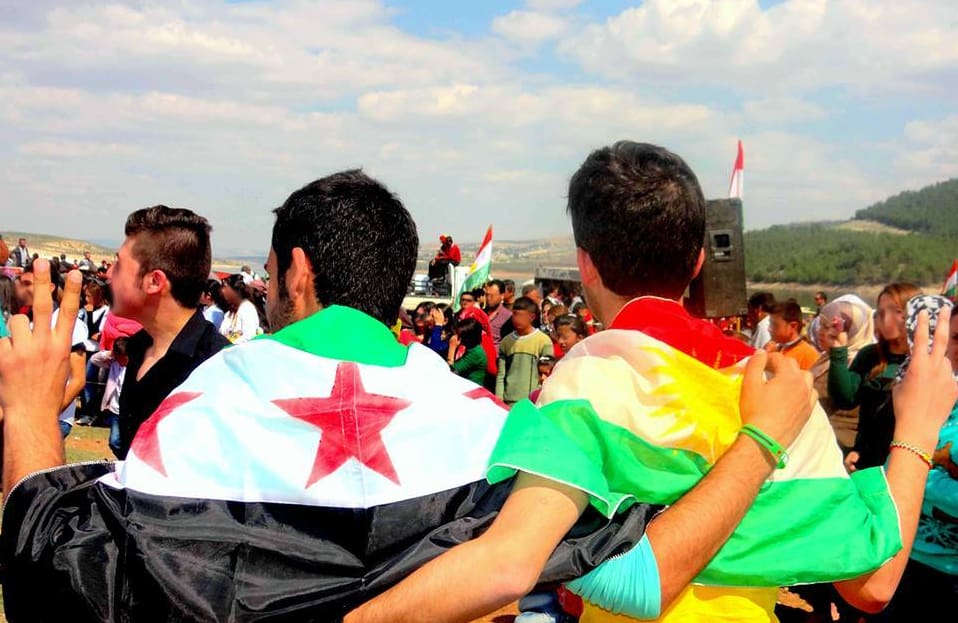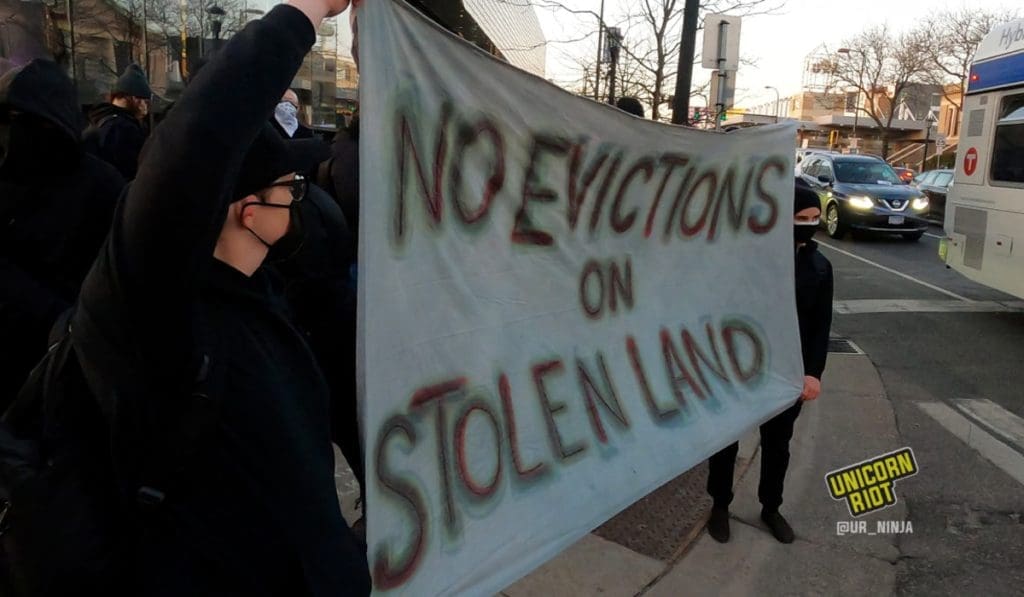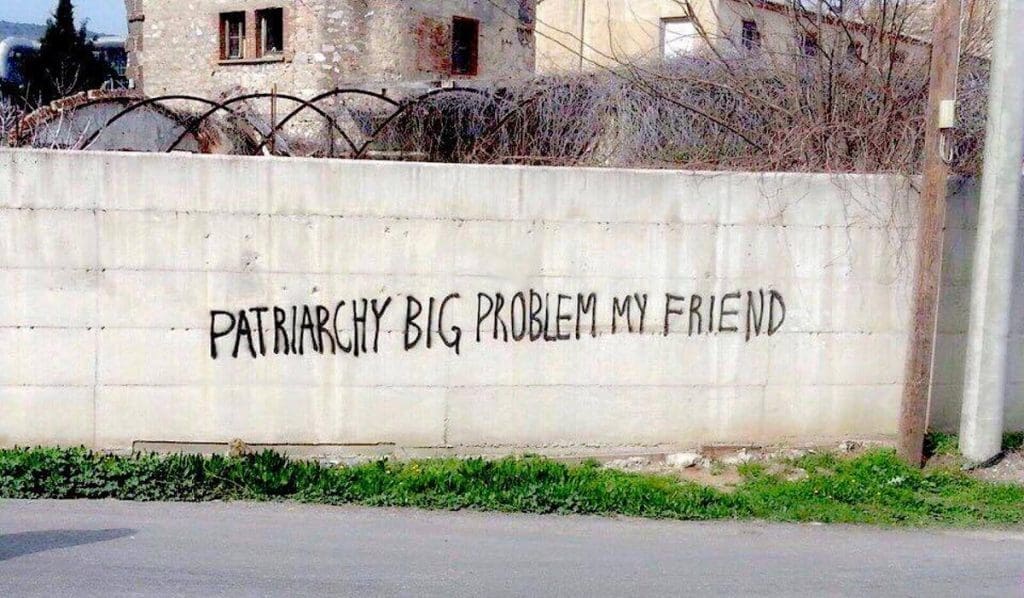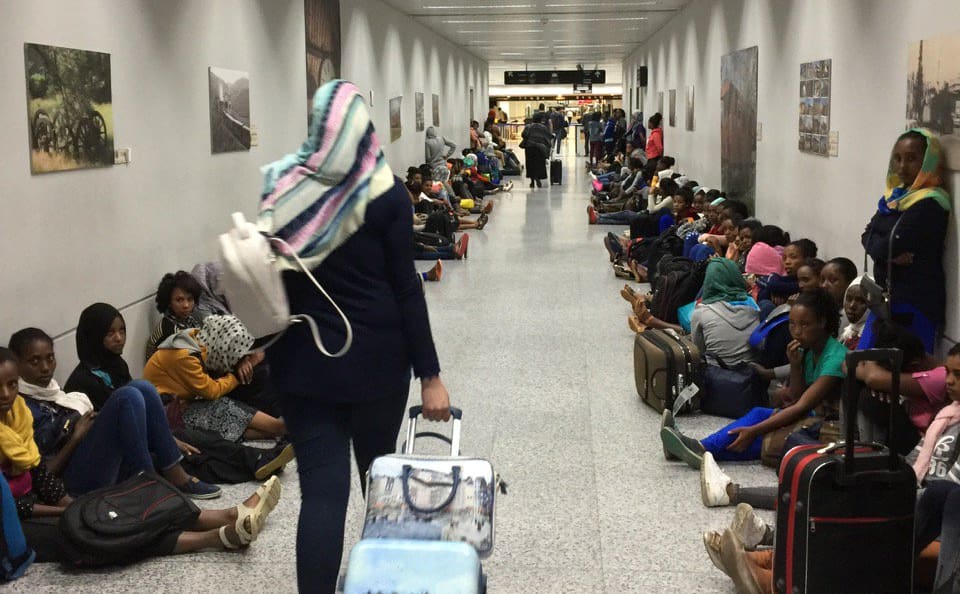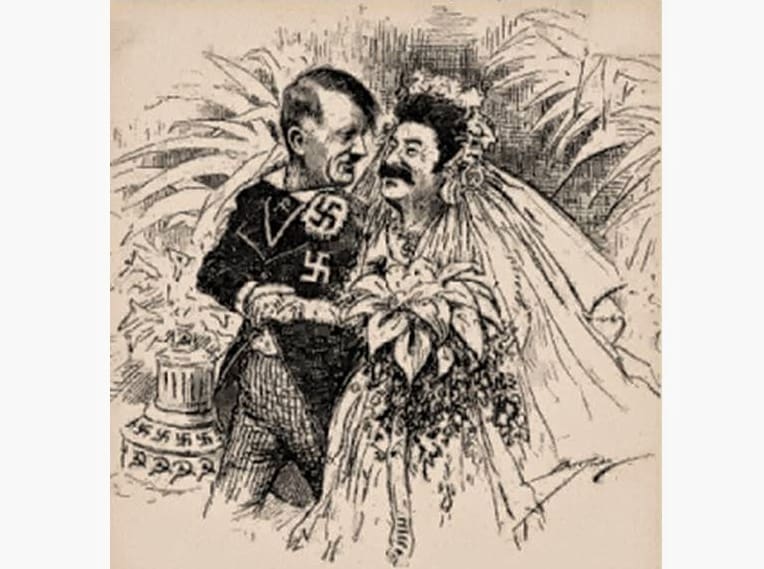Oppose Continuing Assaults on Idlib and on Kurds in Northeastern Syria
by the Alliance of Middle Eastern and North African Socialists
22 August 2019 (original post)
We, the Alliance of Middle Eastern and North African Socialists, oppose the military attacks on the Idlib region and northern Hama as well as threats and assaults against the northeastern regions of Syria. We support all the innocent civilians in Syria.
Solidarity with Idlib against the attacks by Assad’s regime forces and its Russian ally
After months of attacks by the Assad regime and Russian airstrikes on the Idlib region and northern Hama, the Syrian regime’s forces recaptured Khan Sheikhoun, a town in southern Idlib province, and now nearly totally abandoned as residents emptied out the town and fled to areas further north. The town is of strategic importance as it is situated on what was once a vital commercial highway connecting the large northern city of Aleppo to the capital of Damascus. The town is also symbolically significant. Khan Sheikhoun captured headlines in April 2017 when a sarin gas attack by the regime killed some ninety people, including children.
Since the end of April 2019, around 880 civilians have been killed, mostly as a result of the relentless campaign of airstrikes by the Syrian regime and its Russian ally. More than 500,000 people have also been forced to flee their homes, heading to displacement camps where there is no adequate food, water, medicine, or even shelter according to the UN, which warns of a humanitarian “disaster.”
With the nearby Turkish border closed to refugees, many of the displaced are now living in olive groves and sheltering beneath trees. At the same time, At least 47 medical facilities have been bombed and 30 aid workers have been killed.
Idlib province, now home to around 3 million persons — of whom 1.5 million are internally displaced persons — is controlled mostly by the jihadist coalition Hayat Tahrir Sham (HTS, led by formally al-Qaeda-linked Jabhat al-Nusra), which has imposed its own institutions and violently repressed activist networks and civil society organizations.
While affirming opposition to the jihadist coalition of the HTS and other reactionary armed groups in Idlib, progressives are also opposing the shelling and military offensive by the regime and its foreign allies, Russia and Iran. We must stand in solidarity with civilians in Idlib against these military threats, which have already created a humanitarian catastrophe.
We reiterate also our support for the popular sovereignty from below of the Syrian popular classes against all actors, whether local or foreign, preventing them from deciding their own destiny and achieving the initial objectives of the uprising: democracy, social justice and equality.
Solidarity with the Northeastern regions against Turkish military threats
For months, the Turkish military has been threatening and assaulting the northeastern regions of Syria controlled by the Syrian Democratic Forces (SDF), which is led by the military wing of the Kurdish Democratic Union Party (PYD) and its People’s Protection Units (YPG). In mid-August 2019, the United States and Turkey concluded an agreement to establish a so called “safe zone” in northeast Syria. The details of the so-called safe zone are yet to be determined and will be implemented gradually, with some operations beginning soon.
Neither Ankara’s nor the United States’ “safe zone” dimensions were agreed on during the talks. Ankara is seeking much deeper control in Syrian territory than the US was ready to accept. To avoid a deadlock, both sides agreed to go ahead without sorting out the zone’s dimensions. Both Ankara and Washington prioritized the establishment of a joint operation center, and a coordination center in Ankara. These centers will eventually decide the access routes of Turkish units to the east of the Euphrates. In these locations, the US and Turkish observation posts will be constructed; the YPG will withdraw under supervision of the US military; and the YPG will hand over its heavy weapons, artillery, mortars, and multiple rocket launchers to US soldiers. The centers will also facilitate the coordination of the air space and security matters in town centers.
While a possible Turkish military invasion of these areas has been frozen temporarily or at least postponed, the real objective is not only to create a buffer between the Turkish border and areas controlled by the Kurdish-led YPG (which is supported by the US in their fight against the jihadist group ISIS). Turkey’s objective is also to expand Turkish control and influence and crush any form of Kurdish self-determination close to its borders. President Erdoğan and Turkish officials have actually declared that Turkey could pursue its own solutions if the United States does not cooperate in meeting Ankara’s “safe zone” demands.
If Ankara were given the green light to launch a new military operation against the SDF, the operation would represent the third incursion of the Turkish army into Syria against Kurdish-led forces since 2016. The first Turkish incursion was operation “Shield of the Euphrates” in August 2016. The second was operation “Olive branch” in January 2018, which culminated in the occupation of the Afrin region in March 2018, leading to the forced displacement of more than 150,000 Kurds and constant violations of human rights.
Ankara considers the YPG and PYD in Syria as an extension of the Kurdistan Workers Party (PKK), which the United States, the European Union, and Turkey have listed as a terrorist organization. The Turkish army has also been launching military operations and airstrikes against various regions of the northern areas of Iraqi Kurdistan since mid-July, because of the PKK’s presence there. In addition to this, Turkish authorities started a new campaign of repression in Turkey against Kurdish representatives of the Peoples’ Democratic Party (HDP) by replacing democratically-elected Kurdish mayors with state officials in three cities (Diyarbakir, Mardin, and Van) and by detaining more than 400 people for suspected links with the PKK.
Another objective of the Turkish government in Syria is to forcibly transfer Syrian refugees from Turkey to the areas east of the Euphrates. In the past several weeks, Turkey’s government has accelerated campaigns of forced expulsions of Syrian refugees back into Syria. Since July, thousands of Syrians have been subjected to mass deportations or forcibly returned to Syrian territories
Thus, Turkey’s aims are to establish a zone of control along its border where it can manage flows of internally displaced persons, forcibly repatriate refugees from Turkey, and attack the PYD and its Syrian Democratic Forces.
The Alliance of Middle Eastern and North African Socialists also condemn the role of the National Coalition of Syrian Revolution and Opposition Forces (known as the Etilaf), composed mostly of liberal and Islamic conservative and fundamentalist groups and personalities, in its support for Turkish plans against the northeastern areas. The Syrian Coalition and members close to it have also continued their previous chauvinist and racist policies and statements against the Kurds in Syria. Similarly, the head of “National Army,” a cluster of Syrian opposition military groups composed mostly of Islamic fundamentalist and reactionary groups—guilty of many human rights violations in Afrin and elsewhere, and acting as a proxy in favor of Ankara—has also declared that its troops, 14,000 men, were ready to assist the Turkish army in any military operation against the northeastern regions of Syria.
The US and Turkish agreement and the collaboration between Moscow and Ankara demonstrate once again that international and regional powers have no willingness to see any Kurdish national or autonomist aspirations come to fruition.
In the face of these continuous counter-revolutionary offensives, what is needed is solidarity between all Arab, Kurdish, and other ethnic and religious minority progressives and democrats who are against the Assad regime, Islamic fundamentalist movements, and all the regional and international imperialist powers; and who support the struggles for social justice, women’s rights, and the rights of oppressed minorities.
The Alliance of Middle Eastern and North African Socialists reiterates its support for the right of self-determination of the Kurdish people in Syria and in other countries in the region. This does not mean that we take an uncritical stand on the policies of Kurdish parties leading these struggles, whether the PYD or the Kurdish Democratic Party or others, notably regarding human rights violations against civilians. We denounce, for example, the latest SDF campaign of arbitrary arrests against civil society workers in the province of Raqqa.
Oppose all forms of sectarianism and racism!
Solidarity with the oppressed!
Alliance of Middle Eastern and North African Socialists
August 22, 2019

